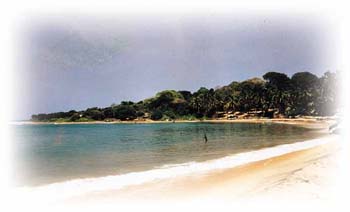
17th September 2000
News/Comment|
Editorial/Opinion| Business| Sports|
Sports Plus| Mirror Magazine

Vanishing beauty
By Meg Williams
 When
the mercifully breezy but rickety old school-bus finally left the vast
open plains and descended into Pottuvil, I felt I had reached a forgotten
town on the brink of the known world.
When
the mercifully breezy but rickety old school-bus finally left the vast
open plains and descended into Pottuvil, I felt I had reached a forgotten
town on the brink of the known world.
Wild elephants tramp together through the scrub on the horizon, omniscient sea eagles circle high in the blue skies, waves pound the distant beaches, buffaloes wallow in the shallows of the estuary while fishing boats paddle precariously back and forth beneath the bridge leading to Arugam Bay.
In the town, children play in the dusty streets, beggars wander, ghost-like from basic shop to shop with outstretched hands, men loiter lethargically in the shade around the wide sandy main street and women tend to remain behind closed doors. Green election flags flutter feebly in the hot wind that occasionally carries the melancholy cries from the minarets. Ox-carts compete with the occasional rice sack-loaded tractor or over-crowded three-wheelers on the narrow lanes that twist through the impromptu suburbs out towards the coast.
This desolate yet beautiful eastern region has a population of roughly 42,000 with 27,000 living in the dusty and sprawling town of Pottuvil itself. Apart from fishing and rice-growing, there are virtually no job opportunities for the fast expanding population.
It is not just the remote location that causes its isolation and lack of development. Although, in the view of many locals, the area has been relatively safe from conflict since 1990, it continues to suffer economically from the effects of being bracketed within the war-zone. Phone lines were only reinstalled three months ago, electricity came here to the lucky few only four years ago and Special Task Force soldiers still control the roads, albeit apathetically.
Foreign embassies continue to warn cautious tourists that the beautiful beaches of the east coast are out of bounds, so there are actually less foreigners here annually than there were when Arugam Bay was on the hippie trail in the Sixties and Seventies. These consist of long-term and often aged surfers pausing in the perpetual search for uncrowded waves, along with backpackers, seeking an atmosphere and cheapness that Sri Lanka's south and western beaches offer less and less as the package tour numbers continue to rise.
Two happy-go-lucky Australian brothers told of how they first came to Arugam Bay in 1978 and, having seen a lot of other tropical paradises go to ruin, come back to this coastline each year for the very reason that it has not yet been spoilt by tourism. Until recently, travellers and surfers who came here had heard of the spot by word of mouth rather than through the long-time hesitant guide books.
However, The Lonely Planet and The Handbook which are two of the most heavily relied- upon sources of travel information now beckon the reader to 'judge for yourself' how 'off limits' Arugam Bay actually is and give fairly extensive coverage of a selection of the dozen or so guest houses and restaurants scattered along the beach.
If the security situation remains - without wanting to tempt fate - safe for foreigners then Sri Lanka's east coast will undoubtedly secure its niche on the Asian tourist route over the next decade.
But for better or for worse, beautiful places across the globe that have been recommended within the pages of the Lonely Planet, from the deepest darkest parts of Latin America through Africa and (most extensively) Asia, have subsequently undergone huge and irreversible changes. Arugam Bay and more generally, Sri Lanka, on the brink of change as it is, could well become a prime example of the degradation suffered by an influx of what the cynic might call a wave of 'neo-colonialism' instigated by bible-like guidebooks. Care must be taken that this does not occur.
A shadow therefore lurks behind the feeling of intense privilege that one feels when coming upon one of the few remaining places of untamed beauty in the world such as Sri Lanka's east coast. The shadow looms because it is startlingly obvious that such a place cannot long avoid the steady march of 'progress' and population growth.
Already in Arugam Bay there is talk of better days gone by. The main source of anxiety here, is caused by an unhappy coupling of the expedient numbers of travellers and guesthouses, with the beach's simultaneously increasing fishing community. Over the past eight years, a growing number of temporary fishing shacks (122 this year) have been erected on the beach, accommodating not only local Muslims from Pottuvil but also Sinhalese and Tamils from other coastal areas here on temporary fishing licences.








![]()
Front Page| News/Comment| Editorial/Opinion| Plus| Business| Sports| Sports Plus| Mirror Magazine
Please send your comments and suggestions on this web site to

